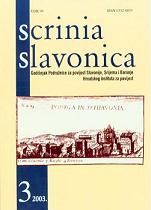Izbor narodnog zastupnika u Ðakovu 1884.
Electing people’s representative in Djakovo 1884
Author(s): Branko OstajmerSubject(s): History
Published by: Hrvatski institut za povijest
Keywords: Ðakovo;Ðakovo district; Croatian Parliament; Sabor; elections; Independent People’s Party (Neodvisna narodna stranka); Party of Rights (Stranka prava);ban Khuen-Héderváry
Summary/Abstract: Kosta Vojnović had two terms of office as the representative of Ðakovo in the Parliament. However, more than the previous two elections, the election in 1884 was marked by various irregularities, which was why the Independent People’s Party lost one of its leading men and prominent representatives. Deputy-prefect, district heads and a great number of civil servants abused the power they had been granted by their position and tampered with the election results; however, the opposition from Ðakovo undoubtedly bore responsibility for the election results. The explanation for Vojnović’s fall can be found not only in many details from the political, social, cultural and economic life of Ðakovo but also in a rather heterogeneous structure of the population. A conflict between deputy prefect’s and municipal servants on one hand and the clergy and lords of the bishop’s estate on the other is obvious. The first group succeeded, as it seemed, in making use of a certain contemporary dissatisfaction of the people with the manorial management, directing it at Vojnoviæ and bishop Strossmayer and portraying Vojnoviæ as a candidate representing clergymen exclusively, that is, bishop Strossmayer. Besides, the fact that Ðakovo district head Sudareviæ won that election can partly be ascribed to his campaigners who gave him prominence and considered him their native son. In fact, it can be assumed that the programmes of the political parties had only insignificant manifestation during the election campaign. In 1884 Independent People’s Party lost election entirely. On the other hand, the Party of Rights achieved considerable success with 24 mandates and therefore the overall success of the opposition was noteworthy. The Ðakovo election of the people’s representative in 1884 made it apparent in which circumstances the following elections in Ðakovo and Croatia under the government of Khuen would take place. Having been faced with relative success of the opposition in the elections of 1884 Khuen decided to secure strong foundations of his rule by establishing electoral system and holding elections.
Journal: Scrinia Slavonica
- Issue Year: 2003
- Issue No: 3
- Page Range: 391-412
- Page Count: 22
- Language: Croatian

